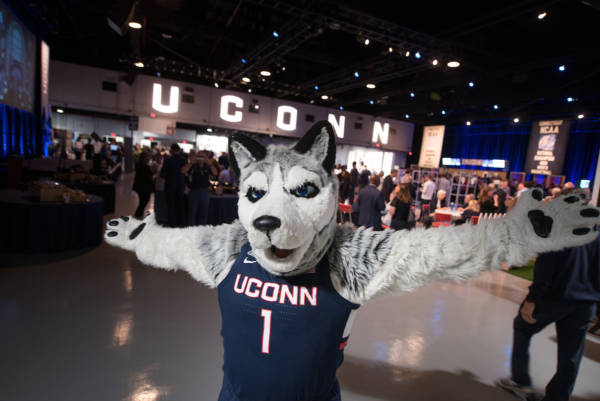Victorious in Greece
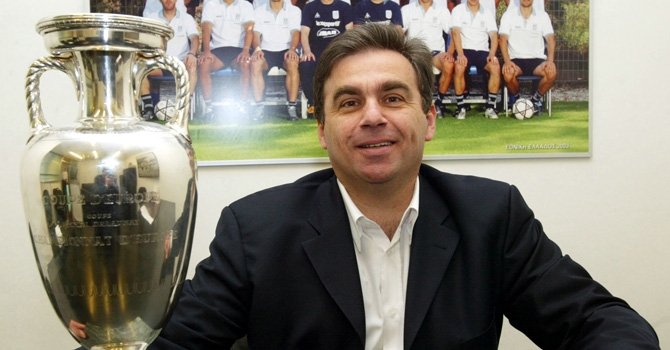
In 2004, the Greek national soccer team stunned the world by winning the Union of European Football Associations (UEFA) European Championship, going undefeated and ultimately beating the heavily favored Portuguese team, 1-0, in the final at Portugal’s home stadium in Lisbon. It was an especially astonishing accomplishment considering that Greece had only previously qualified for two other major tournaments, in 1980 and 1994. When the tournament began, the odds against Greece winning were calculated at 150 to 1. Ioannis Farfarellis ’87 MA, the head of business, marketing, and media rights for the Hellenic Football Federation, was in the stadium to watch that victory.
“That was probably the epitome of our success story,” Farfarellis remembered. “It was a big achievement for a nation our size — we’re a small country, but we came away with the trophy. It was amazing.”
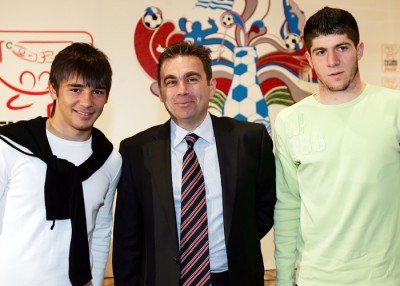
Farfarellis himself played no small role in Greece’s David-versus-Goliath success. He was hired by the Hellenic Football Federation in 1998 to be the organization’s first-ever business director, in charge of television, sponsorships, and merchandizing rights. Founded in 1926, the Athens-based Hellenic Football Federation is the governing body of soccer in Greece and encompasses around two million soccer players and 6,000 club teams. But the Greek national team, a perennial also-ran in European soccer, had almost no international profile, few sponsorship deals, and limited television coverage outside of the country.
Although he was born and grew up in Greece, Farfarellis’s quest to rebuild his national soccer team actually began in Connecticut. He attended boarding school in England, but didn’t like the weather or the food, so he decided to attend college at Southern Connecticut State, where his parents knew a professor. He then stayed in the U.S. to do a master’s in international relations and political science at UConn.
“UConn came as a natural next step, as it was always seen as the big public Ivy in Connecticut,” Farfarellis said. “It had an excellent faculty and reputation in my academic area, a very rigorous postgraduate program, and a stunning campus.”
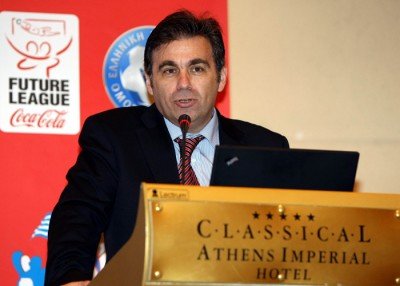
After earning his MA in 1987, Farfarellis returned to Greece to perform his mandatory military service, then stayed in Europe to work a succession of jobs ranging from London-based commercial director for a Greek company, to European Union administrator, to a corporate training manager, before finally being hired by the Hellenic Football Federation. Ironically, Farfarellis was always more interested in basketball than soccer — he’s a fanatical Huskies fan, regularly staying up until 4 a.m. at his Athens home to watch both men’s and women’s games on satellite TV. (When I spoke to him in December, he was still mourning the men’s recent loss to Yale — the first time an Ivy League school had defeated UConn in 28 years.)
Under Farfarellis, the Greek team embarked on a major rebranding effort. It signed up a new set of sponsors (including Adidas and Mercedes-Benz), created a new logo, and redesigned its uniforms. All of this dramatically increased the Federation’s revenue, allowing them to hire a new team of coaches, build a modern training center for the national team, and expand its youth soccer programs. Farfarellis’s success soon brought him to the attention of UEFA, the governing body of European soccer, which hired him to advise other national teams how to build their brands. He’s also consulted with FIFA, the international soccer federation that stages the World Cup.
“We’re talking about a true global market for selling sports rights,” Farfarellis explained. “Commercial and TV rights account for about 60 percent of the revenue for any national federation, so it’s extremely important.”
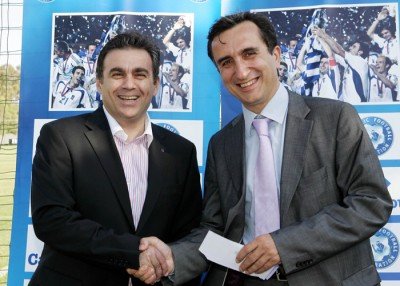
Although the Greek national soccer team hasn’t been able to repeat their Euro 2004 success, Farfarellis notes with pride that they’ve qualified for every major soccer tournament since. In the 2014 World Cup in Brazil, they made it to the Round of 16, where they were eliminated by Costa Rica on penalty kicks. Farfarellis was in Brazil for that match, just as he’s been during the final stages of every tournament since 1998. Spending 30 to 45 days on the road with the team during these tournaments is the most exciting part of his job, he said.
“You’re camping with the team, you’re dealing with marketing and TV rights issues, you’re facilitating the team’s movement — travel, accommodations, many things. Everything except the sporting decisions.”
When asked what he’d tell current UConn students hoping to follow in his footsteps, Farfarellis advised sticking to the basics. “The most important thing is to develop core skills — leadership skills, communication skills, decision-making skills, and above all numerical skills. Even if you don’t like math or statistics, be prudent enough to take some courses. It’s not so important to figure out what you want to do. You can figure that out later.”
